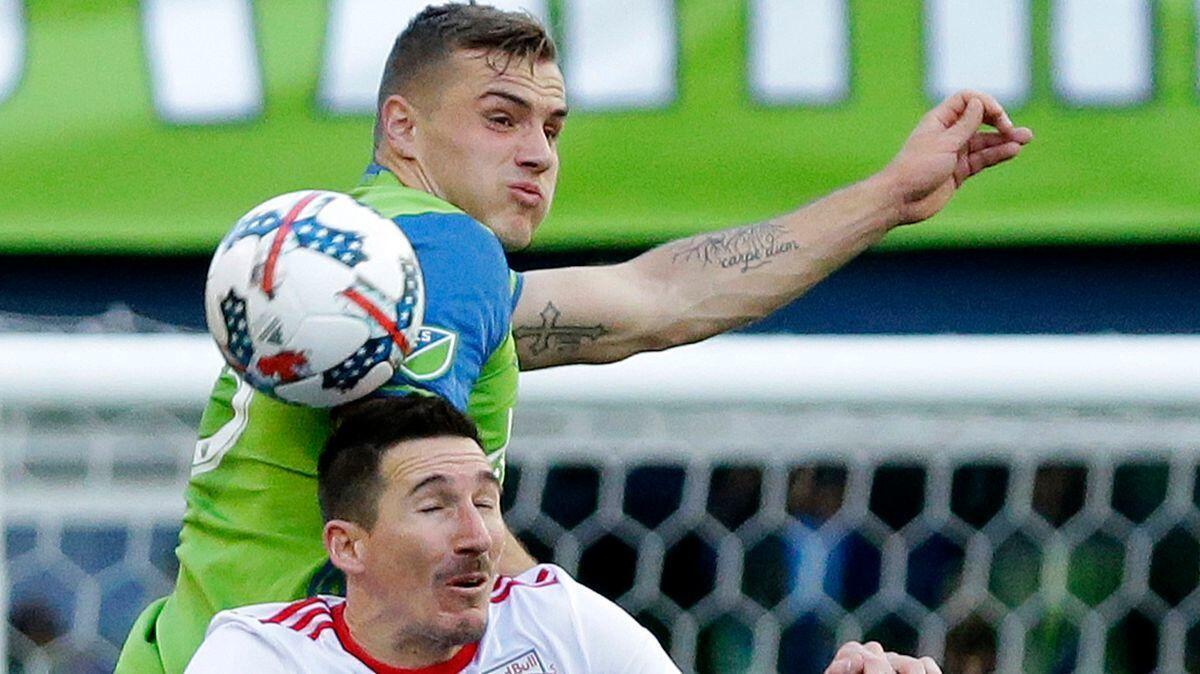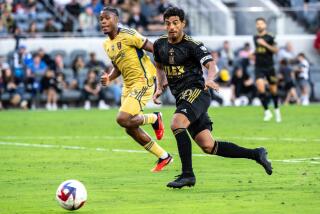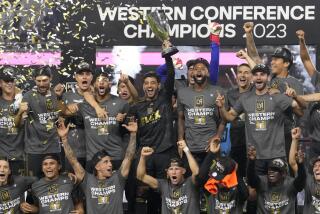For U.S. soccer team, diagnosing an injury can be a matter of trust

Imagine Stephen Curry twisting a knee while playing for the Golden State Warriors, then limping off to join the U.S. national team. Or Clayton Kershaw tweaking his elbow pitching for the Dodgers, then packing his bags to pitch in the World Baseball Classic.
Wouldn’t happen, right?
So then why were the Seattle Sounders helping Jordan Morris off the field Sunday afternoon, then helping him to the airport Sunday night to catch a flight to join the U.S. national team ahead of Friday’s World Cup qualifier against Honduras?
“Some of this is culturally soccer,” said Garth Lagerwey, general manager of the Sounders and the man who pays Morris’ salary. “It’s a global sport and this is what the rest of the world does.”
But a bigger part of it is trust. Clubs have been loaning their players — sometimes injured ones — to national teams since the invention of the sport. And that doesn’t happen unless both sides are in agreement over how and when their players will be used.
“For most club teams that’s really the key,” Lagerwey said. “Do you trust the guy on the other side of the phone? Are our interests aligned in terms of rehabilitating the player and developing him safely?
“It’s a partnership.”
FIFA rules require club teams to release healthy players for national team games such as World Cup qualifiers and major international tournaments like the European Championships. Penalties for noncompliance can be severe.
However there is a gray area around injured players. Who diagnoses the injury and its severity, the club or the national team? And what if a national team insists and the club resists?
“I don’t think it would ever come to that,” said Ron Shinault, head trainer for the San Jose Earthquakes. “There’s always trying to do what’s right by the player.”
Still the issue has taken on added significance this week, with the U.S. struggling to find enough healthy bodies to field a team for crucial World Cup qualifiers with Honduras on Friday and Panama next week in Panama City. The U.S., which lost its first two games in the six-team, 10-game tournament, needs at least a win and a draw to get its qualifying campaign back on track.
Yet even before the team began gathering last Sunday, four key players — forward Bobby Wood, winger Fabian Johnson and right backs DeAndre Yedlin and Eric Lichaj — were ruled out with injuries.
Goalkeeper Tim Howard (groin surgery) and forward Clint Dempsey (irregular heartbeat) have only recently returned from lengthy absences. And center back John Brooks had his trip to San Jose delayed so his club team, Hertha Berlin, could have an MRI done on his sore right knee.
Then there’s Morris, who hobbled into camp, then missed the first day of training to get treatment on his ankle.
George Chiampas, doctor for the U.S. national team, insists determining a player’s game fitness isn’t influenced by the importance of the competition. So late Monday the U.S. called up forward Chris Wondolowski, lessening the pressure for Morris to play if his ankle remains sore.
“We want to make sure that the clubs recognize that the player’s best interest is always first and foremost,” Chiampas said
MLS teams often find themselves emphasizing the same point with other national federations. When Panama tried to call up Earthquakes defender Harold Cummings, who had only recently returned to training following surgery, Shinault objected and the Panamanians backed down.
Those discussions aren’t always so easy. Although international competitions often have more cachet, it’s the club teams that pay the players’ salaries. So if a player is injured on international duty, the national federation must reimburse the club, as U.S. Soccer did last fall when Howard was hurt in a World Cup qualifier with Mexico.
To avoid the appearance of bias, Shinault said he remains an advocate for the player. Sure, club games are important, he tells them. But playing for the national team? That’s a rare honor.
“If somebody ever said to you, ‘Do you want to go to the Olympics?’ you would probably never say no,” he said. “So when you look at it from a player perspective, it has some similarities to the Olympics. And it would be somewhat shortsighted to say, ‘Oh, he’s our player and I don’t want him to risk anything outside our needs and our environment.’
“Nobody would ever tell Michael Jordan we don’t want you playing on the Dream Team.”
Twitter: kbaxter11







